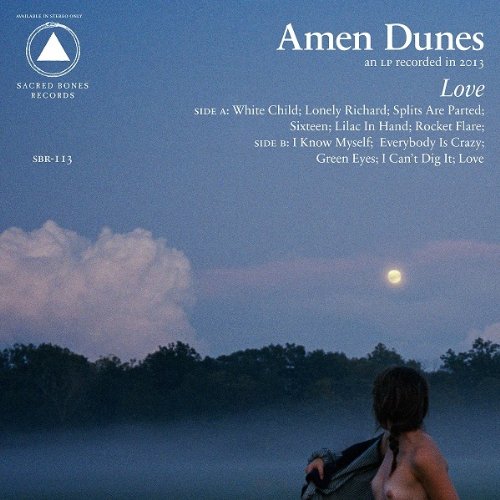
Amen Dunes
Love
Release Date: May 13, 2014
Genre(s): Pop/Rock, Alternative/Indie Rock, Post-Rock, Experimental Rock, Neo-Psychedelia, Alternative Singer/Songwriter, Indie Folk, Free Folk
Record label: Sacred Bones
Music Critic Score
How the Music Critic Score works
Buy Love from Amazon
Album Review: Love by Amen Dunes
Excellent, Based on 10 Critics
Based on rating 4.5
For some people, Amen Dunes is the perfect embodiment of art in music. That’s to say that the level of artistry involved in the creation of the last record Through Donkey Jaw absolutely knocked some folks completely sideways. In realistic terms, you could rank Damon McMahon amongst the few genii operating in music today – think John Cale circa Paris 1919 for a temperate comparison.
Based on rating 4.5/5
Everyone wants to be beyond, or at least be headed in that direction. After the ashes have blown away and civilizations have been rendered faint memories, we wanna be the one with the grim satisfaction of both clearly seeing the world’s self-destruction and somehow escaping the unthinkable fate tied to it. We wanna think around our emotions, laugh about them before they become troubling obfuscations.
Based on rating 8/10
Some artists' music gets more intricate as the years pass, while others, like Amen Dunes' Damon McMahon, pare it down to its essence. While 2011's sprawling Through Donkey Jaw suggested he could go in almost any direction on his next album, on Love he forgoes much of that woolliness -- some of which ended up on the smaller-scale releases Ethio Covers and Spoiler -- resulting in songs with a newfound clarity and serenity. The album begins with some of McMahon's most appealing music yet: "White Child" manages to be bold and eerie at the same time, tempering its punchy brass with trippy woodwinds and a melodic sensibility that evokes fellow travelers Epic Soundtracks and Greg Ashley.
Based on rating 4/5
Though Damon McMahon resides in deepest Brooklyn, his third album as Amen Dunes evokes sun-dappled countryside. Led by the dreamy strum of ‘Lonely Richard’, ‘Love’ is a lush, romantic, folk-driven collection that moves away from his earlier, more psychedelic work. The lo-fi scratch of old evaporates, save for momentary gristle on ‘I Can’t Dig It’.
Based on rating 7.8/10
Damon McMahon’s work as Amen Dunes has been a process of expansion. The confined, loner vibe of his 2009 debut DIA sounded like it was made in a cabin in the woods—which it was—but it also hinted at wider vistas McMahon might someday explore. That promise was realized on 2011’s Through Donkey Jaw, as he extended his sonic palette while retaining his introspective bent.
Based on rating B
Brooklyn-based musician Damon McMahon has been steadily making music as Amen Dunes since 2006, releasing off-the-cuff, evolving lo-fi pop songs that are always weird, though never entirely inaccessible. While those albums were usually recorded over the course of a couple of weeks, sometimes in one take, his third studio album, Love, arrives as the product of nearly two years of painstaking work. During the album’s genesis, McMahon drew upon the likes of Sam Cooke, Elvis Presley, and Marvin Gaye.
Based on rating 7/10
On his third studio album as Amen Dunes, Damon McMahon has created a melting pot of inviting tones rooted in the traditions of soul king Sam Cooke, the spirit of jazz's First Lady Alice Coltrane, and the romance of Motown man Marvin Gaye..
Based on rating 7/10
Damon McMahon, aka Amen Dunes, has long played music on the fringes. Albums like DIA and Through Donkey Jaw sounded like they were far off, music humming not just through one thin wall but perhaps many thick ones. In places, Amen Dunes sounds more like the impression of music than music itself. It hints at structure but melts at the edges.
Opinion: Excellent
Though Damon McMahon has a solid enough following these days - discerning rather than cultish or underground - as well as validation from his peers (members of God Speed You Black Emperor! helped produced Love, if that counts), it still needs reiterating just how much of a masterpiece his second record, Through Donkey Jaw, was. In a grim lo-fi fog that lurched to noisy, somewhat unmusical places at times, that was a primal scream of an album speckled with melodic finesse on songs 'Lower Mind', 'Swim Up Behind Me' and 'Christopher'. It balanced the dishevelled aesthetic of Syd Barrett or Skip Spence with something fiery and wild, as on the decidedly anti-Beatles 'Tomorrow Never Knows'.
Opinion: Fairly Good
Sometimes an album’s cover art sets the tone for the music, and sometimes, as is the case with Amen Dunes’ Love, it seems entirely at odds with it. Misty landscape, full moon rising, you can almost feel the clear air. Yet this is, in its most literal sense, chamber music. It’s hard to picture Amen Dunes ringleader Damon McMahon crafting this record in anything other than late-night solitude, in darkened rooms, in quiet contemplation.
'Love'
is available now

